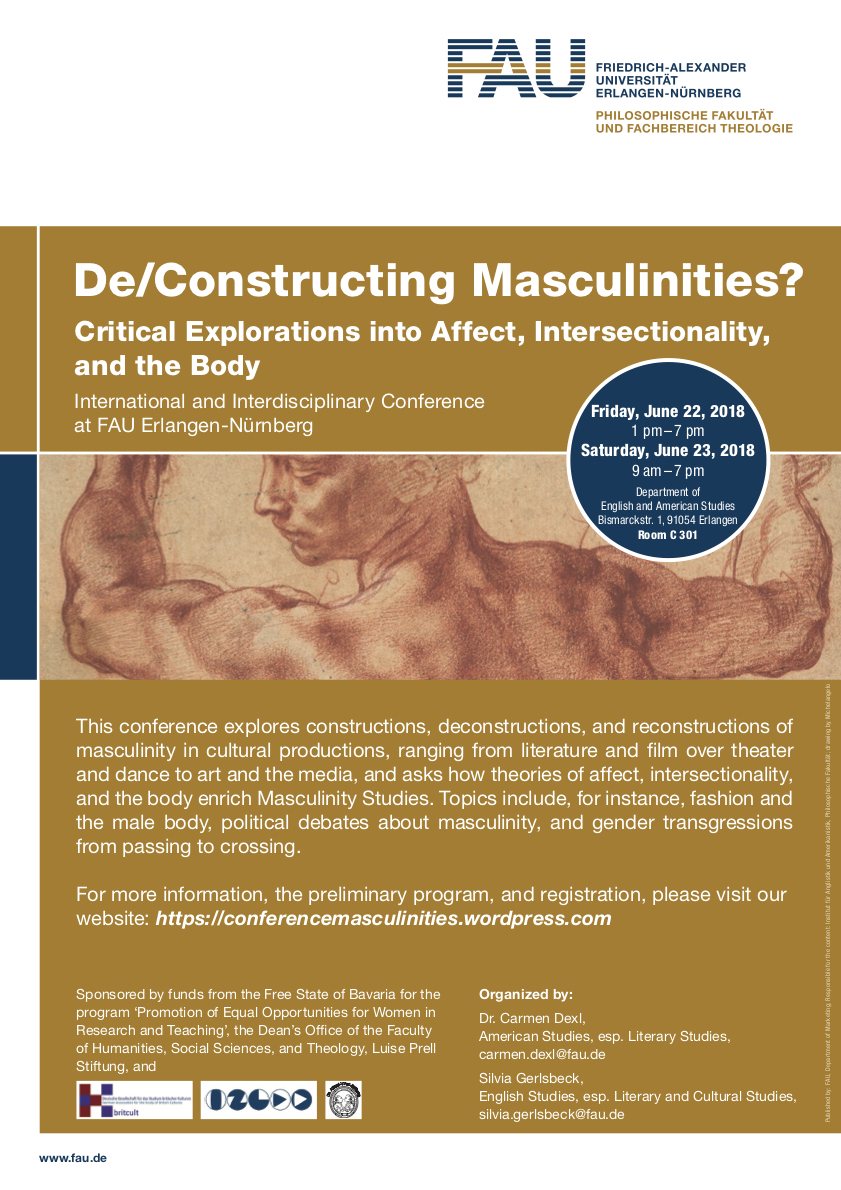„De/Constructing Masculinities? Critical Explorations into Affect, Intersectionality, and the Body“
 International and interdisciplinary Conference
International and interdisciplinary Conference
De/Constructing Masculinities? Critical Explorations into Affect, Intersectionality, and the Body
FAU Erlangen-Nürnberg, Germany, June 22–23, 2018
This conference seeks to explore and explicate the critical potential that theories of affect, intersectionality, and the body hold in store for the study of masculinities. It takes its cue from the ever-present debate about masculinity and its status in Western societies—a multifaceted debate which has, at least since the late 1960s, resurfaced in media, cultural, and academic discourses alike: Writers like Philip Roth, Ian McEwan, Graham Swift, Martin Amis, Paul Auster, John Irving, and Stephen King, for example, have depicted white men in crisis; authors such as Hanif Kureishi, Kobena Mercer, or Jackie Kay have expanded this topos to configurations of racialized or transgender masculinities. These literary and cultural negotiations have been shaped by and, in turn, reshaped political events and activist campaigns that contributed to putting the (white) male subject under critical scrutiny. The Black Lives Matter movement, for instance, has directed public attention to systematic racial violence in an era of police killings and mass incarceration, thus confronting issues such as the abuse of power and the racial bias of the law. The #metoo-campaign has sought to foreground the ubiquity of sexual violence against women and again spurred public discussion of the power asymmetries between men and women. These and other critical interrogations of “hegemonic masculinity” (R. W. Connell) notwithstanding, this century saw the upsurge of a new right-wing politics alongside a rise of authoritarian leaders who—despite the alleged “crisis” of masculinity—seem to embrace, rather than abandon, traditional notions of masculinity. How constructions, deconstructions, and reconstructions of masculinity connect is one of the guiding questions of this conference.
While white masculinity was for a long time marked by an “overgeneralization from male to generic human experience” (40), as Harry Brod notes in his 1987 study The Making of Masculinities: The New Men’s Studies, the last two decades have witnessed a paradigm shift towards a recognition not only of men as gendered beings, but also of a plurality of masculinities. New Men Studies, which now constitutes an established and renowned field of research, put the particular instead of the universal male subject into focus. It conceives of masculinity as an intersectional category that is interlocked with other differential categories, such as race, ethnicity, class, sexuality, or age. In addition, it connects to both affect and body studies in exploring the status of desires, emotions and feelings, and corporeal aspects for images of masculinity.
While recognizing the gains these new research paradigms have yielded and attempting to explicate their merits, the special emphasis of this conference on issues of affect, intersectionality, and the body also seeks to explore possible limitations. It asks how these theories can explain the rise of populism and reconstructions of masculinity, for example by attending to the political power of affect. It examines if and how these theories can contribute insights into constructions of queer or transgender masculinities. It also raises the question of how Western theory can account for global or ‘other’ masculinities, such as those marked by post- and/or neo-colonialism, or for ‘neo-Orientalist’ perspectives that serve to submit ‘marginal’ masculinities. A further concern is the inquiry into the apparent paradox of thinking together poststructuralist concepts of the body as a discursive construction and the actual materiality of the body without forfeiting the critical potential of these theoretical paradigms.
Against this background, this conference wants to explore (de- or re-)constructions of masculinity in cultural productions, ranging from literature and film over theater and dance to art and the media, and ask how theories of affect, intersectionality, and the body enrich Masculinity Studies, for example, by helping us to rethink constructions of masculinity, intervene in debates about gender politics and diversity, and make sense of the rise of right-wing populism. For that purpose, we invite papers that engage questions such as the following:
❖ How were culturally specific ideals of masculinity historically constructed and disseminated? How have masculinities been constructed as well as de- and reconstructed in cultural productions?
❖ How have European colonialism and global power asymmetries influenced constructions of masculinity and gender roles? What perspectives do postcolonial studies offer here?
❖ What is the role of violence and sexuality for the construction of what R.W. Connell defined as “hegemonic masculinity”? What are the functions of representations of ‘hyper-masculinity’ in culturally and historically specific contexts?
❖ How do cultural productions engage and reveal anxieties regarding the social construction of masculine identities and patriarchal norms?
❖ What are the critical possibilities and/or limits of theories of intersectionality, affect, and the body for the study of masculinities?
❖ How does the widely-cited contemporary ‘crisis of masculinity’ resonate in political and social discourses as well as in cultural productions, including film, literature, art, theater, and dance?
We welcome papers, posters, performance, and artwork proposals from the fields of Literary Studies, Cultural Studies, Art History, Theater and Film Studies, Dance and Performance Studies, Gender, Queer, LGBTI and Critical Race Studies, Political Science, Legal Studies, Psychology, Anthropology, and Sociology. Our conference aims to bring together academics from different disciplines as well as creative artists to provide for an intellectually engaging and stimulating dialogue amongst participants.
Contact Info:
Dr. Carmen Dexl. American Studies, FAU Erlangen-Nuernberg, Germany. E-Mail: carmen.dexl@fau.de
Silvia Gerlsbeck. English Literary and Cultural Studies, FAU Erlangen-Nuernberg, Germany. E-Mail: silvia.gerlsbeck@fau.de
All presenters must register for the conference no later than April 15, 2018.
For further Information see here.

